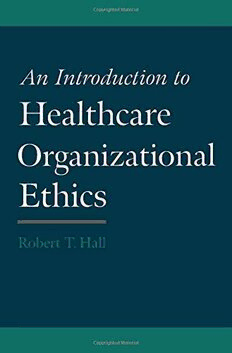Table Of ContentAn Introduction to
Healthcare Organizational Ethics
This page intentionally left blank
AN INTRODUCTION TO
HEALTHCARE
ORGANIZATIONAL
ETHICS
Robert T. Hall
West Virginia State College
OXFORD
UNIVERSITY PRESS
2000
OXPORD
UNIVERSITY PRESS
Oxford New York
Athens Auckland Bangkok Bogota Buenos Aires Calcutta
Cape Town Chennai Dar es Salaam Delhi Florence Hong Kong Istanbul
Karachi Kuala Lumpur Madrid Melbourne Mexico City Mumbai
Nairobi Paris Sao Paulo Singapore Taipei Tokyo Toronto Warsaw
and associated companies in
Berlin Ibadan
Copyright © 2000 by Oxford University Press, Inc.
Published by Oxford University Press, Inc.,
198 Madison Avenue, New York, New York, 10016
http://www.oup-usa.org
1-800-334-4249
All rights reserved. No part of this publication may be reproduced,
stored in a retrieval system, or transmitted, in any form or by any means,
electronic, mechanical, photocopying, recording, or otherwise,
without the prior permission of Oxford University Press.
Library of Congress Cataloging-in-Publication Data
Hall, Robert T. (Robert Tom), 1938-
An introduction to healthcare organizational ethics / Robert T. Hall.
p. cm. Includes bibliographical references and index.
ISBN 0-19-513560-1
1. Health maintenance organizations—Moral and ethical aspects. I. Title.
RA413.H35 2000 362.1'04258—dc21 99-049875
987654321
Printed in the United States of America
on acid-free paper
Dedico este libro a Mary Kay,
quien alienta e ilumina mi vida.
This page intentionally left blank
Preface
This book is an attempt to address ethical questions in health care as they arise
on the business or organizational level: to spell out an ethical perspective for
healthcare organizations. I do this, first, by considering the nature and function
of an organizational ethics perspective in healthcare and, second, by taking up
many of the topics with which this field must be concerned. Far from being the
last word on many of these topics, given the virtual absence of relevant litera-
ture in most cases, this is hardly the first word. It is my hope, however, that this
discussion will be useful to students in health services management, healthcare
professionals, and healthcare administrators who are facing these issues.
Chapter 1 begins with an analysis of ethical decision making in healthcare
organizational management, including an outline of two analytical strategies
that might be adopted for the development of an organizational ethics perspec-
tive. Chapter 2 addresses some of the macro questions of organizational ethics
through an analysis of corporate social responsibility in for-profit and not-for-
profit organizations, as well as the issue of uncompensated care. Chapters 3 to
11 take up many of the topics that healthcare organizational ethics analysis will
have to address. These include aspects of patient services, marketing, managed
care, program development, community relations, diversity, employee relations,
regulatory compliance, and medical records. Healthcare institutions are, in fact,
business organizations, with most of the problems faced by corporate manage-
vii
viii PREFACE
ment in other fields. They differ, however, in that health care holds a special
place among human needs and has traditionally been addressed from an altruis-
tic perspective. Chapter 12 offers some comments on the development of orga-
nizational ethics programs that may be of interest to administrators and to pro-
fessionals who serve on clinical ethics committees—especially those who are
grappling with the new standards on organizational ethics promulgated by the
Joint Commission on Accreditation of Healthcare Organizations.
Many cases are included not only to illustrate points but also to direct the
reader's attention to aspects of issues not previously mentioned. The cases are
all either real incidents or composites drawn from similar situations that have
arisen in different places. Identifying details have been changed in most cases
and, of course, specific sources are not cited. References to relevant documents
are included: Appendices 1 to 6 contain a few of the most important sources.
Alderson, West Virginia R. H.
September 1999
Acknowledgments
This project would not have been possible without the help of a large number
of people. I owe special thanks to Mary Kay Buchmelter, Gerry Beller, L.
O'Brien Thompson, Tom Michard, John Richards, Mary Lucas, Sharon Hall,
Gary Chernenko, Karen Frashier, Woody Moss, Jackie Glover, Cynthia Bar-
nette, Bruce Foster, Robin Reynolds, Drema Pierson, James Patterson, Michael
Lewis, Sean Chillag, Greg Rosencrance, Ed Welsh, Les Melton, Robert Lyman
Potter, Bob Bendiksen, Mark Sheldon, Paul Schyve, Jill McDaniel, Warren
Point, J.K. Lilley, Elizabeth Spangler, Lillian Morris, Fran Brooks, Denise
Maillot, Chuck Lucente, Martin Kommor, Joyce Broglio, Mary Lou Lewis,
Mary Hogue, Charles Covert, Warren Radtke, Jeannie Bess, Abainesh Mitiku,
Ann Rinehart, Gladys Kuhn, Don Patthoff, Patricia Schafer, Jeff House, and
Charlie Cohen.
Research for this book was supported by The West Virginia Humanities
Council.
ix

